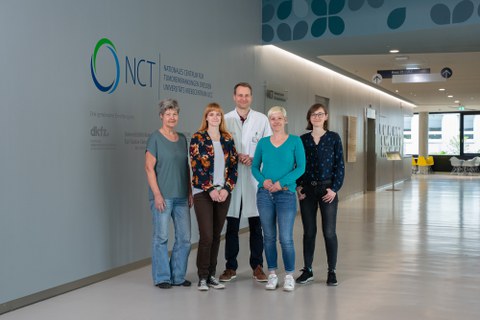May 05, 2025
Help for families with rare diseases: Researchers at Dresden University Medicine use new method for human-genetic diagnosis

New methods for human genetic diagnosis: Two generations of the von Ryssel family, in which two members were diagnosed with familial adenomatous polyposis as part of the research project. Scientist Alexandra Baumann (right) and specialist in human genetics Dr. Arne Jahn (third from right) are part of the research team from the Institute for Clinical Genetics and Translational Medical Oncology at the NCT/UCC in Dresden.
Genetic diagnostics are becoming increasingly important in clinical practice. Especially when it comes to rare diseases and cancer, new genome sequencing technologies help to identify genetic mutations in individuals and groups of people, enabling more accurate diagnoses to be made. An interdisciplinary research group at the National Center for Tumor Diseases (NCT/UCC) Dresden, a joint institution of the German Cancer Research Center (DKFZ), the Faculty of Medicine at TUD, Dresden University Hospital and the Helmholtz-Zentrum Dresden-Rossendorf, has been able to make a human genetic diagnosis for a family using an innovative sequencing method. There was a family history of colon polyps and colon cancer for several generations. The study "Long-read genome and RNA sequencing resolve a pathogenic intronic germline LINE-1 insertion in APC" by Dresden University Medical Center has now been published in "npj Genomic Medicine".
Genetic diagnostics aims to improve individual patient care. However, the possibilities of routine procedures are limited. For one family, in which several members developed colon polyps from childhood and went on to develop intestinal tumors, it had no effect. Researchers working in clinical genetics and translational medical oncology at the NCT/UCC in Dresden, then teamed up with University Hospital Dresden to use a new technology to sequence the genetic material of both long DNA segments and the RNA extracted from them. This led to the discovery of a mobile element that they were able to identify as the cause of the family's symptoms: a rare form of familial adenomatous polyposis. This hereditary condition causes a large number of polyps to grow in the colon on account of a disease-causing variant. If left untreated, almost all people with the disease develop colon cancer by the age of 40. Children of people with familial adenomatous polyposis have a fifty percent risk of inheriting the disease-causing variant and thus also developing the disease.
"The diagnosis was extremely important to the family for many reasons. On this basis, it is now possible to carry out predictive testing of relatives. This allows the predisposition to the disease to be identified before clinical symptoms appear and individual care recommendations to be made," explain Dr. Arne Jahn, research group leader for Genetic Tumor Risk Syndromes at the NCT/UCC Dresden, and Prof. Hanno Glimm, head of the Department of Translational Medical Oncology at the NCT/UCC. Both are co-authors of the study, together with Prof. Evelin Schröck, Head of the Institute for Clinical Genetics.
"This project is a significant step in establishing of new sequencing technologies and combining different data sets, known as multi-omics, to investigate biological processes and diseases. There is a clear advantage to the analysis of multiple levels of DNA and RNA in comparison to methods that are currently available. In the future, we will offer these diagnostic service to selected patients with rare diseases and tumors. We expect this to bring benefits in care," adds Hanno Glimm.
Background: INSTRUCT
The "INSTRUCT" project is a collaboration between the Genetic Tumor Risk Syndromes Research Group at the NCT/UCC Dresden, the Institute of Clinical Genetics at the University Hospital Dresden, which is also a center in the European Reference Network for Genetic Tumor Risk Syndromes (ERN-GENTURIS), and Translational Medical Oncology at the NCT/UCC Dresden with the participation of the DRESDEN concept Genome Center (DcGC). The publication highlights the opportunities offered by broader and more in-depth genetic diagnostics for people with rare diseases and tumors, which are to be promoted in the national genome sequencing model project, including at the Dresden site.
genomDE- National strategy for genomic medicine: https://www.bundesgesundheitsministerium.de/themen/gesundheitswesen/personalisierte-medizin/genomde-de.html
Genome sequencing for rare diseases and cancer:
https://www.uniklinikum-dresden.de/de/presse/aktuelle-medien-informationen/genomsequenzierung-bei-seltenen-und-krebserkrankungen
The sequencing method
The sequencing method currently used in routine diagnostics (next generation sequencing) reads approximately 150 base pairs in a highly parallelized reading process using specific light signals from short pieces of DNA. The reads are assigned to a reference using bioinformatic software (mapping), so that variants can then be identified in comparison to this reference (variant calling). With third-generation sequencing, several thousand base pairs can be read per reading process (based on light signals or the electrical voltage of a pore) enabling complex genomic regions, complex structural variants, and individual genetic characteristics can be better investigated.
The study: "Long-read genome and RNA sequencing resolve a pathogenic intronic germlineLINE-1 insertion in APC"(DOI 10.1038/s41525-025-00485-5) was recently published in "npj Genomic Medicine" .
Contact:
Dr. med. Arne Jahn
Specialist in human genetics
Institute for Clinical Genetics, University Hospital Dresden at the TU Dresden
Group leader of the research group "Genetic Tumor Risk Syndromes",
National Center for Tumor Diseases (NCT/UCC) Dresden
+49 (351) 458-4278
https://www.nct-dresden.de/de/das-nctucc-dresden/abteilungen-und-forschungsgruppen/forschungsgruppe-genetische-tumorrisikosyndrome
Anne-Stephanie Vetter
Staff Unit Public Relations Carl Gustav Carus Faculty of Medicine
of the TUD Dresden University of Technology
National Center for Tumor Diseases (NCT/UCC) Dresden
+49 (0) 351 458 17903
www.tu-dresden.de/med
